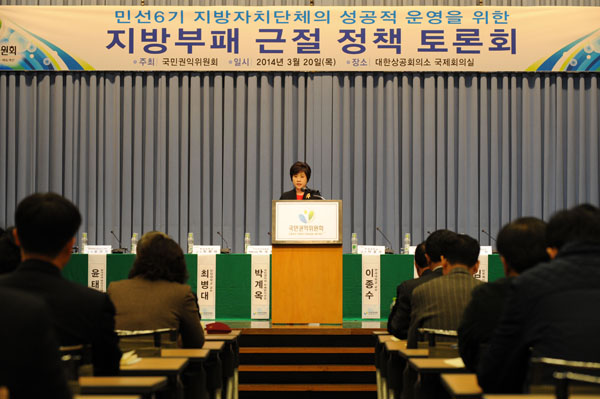ACRC holds policy discussion on corruption in local government
- Date2014-05-12
- Hit4,791

Local government officials accounted for 57.5% of the 5,080 public officials against whom disciplinary measures were taken due to corruption or violation of the code of conduct over the last 3 years. This figure is double the number of such public officials in central government offices.
More than half of the corrupt acts were related to bribery such as receiving money, gifts or entertainment. However, only 15.9% of them were detected through self-inspection by each organization, while most of the cases were exposed by external agencies such as investigative agencies, the Ministry of Security and Public Administration, or competent supervisory agencies. Furthermore, 65% of the corrupt officials were only subject to light sanctions, such as warning or caution.
These findings were presented at a public discussion that the ACRC hosted on March 20 at the Korea Chamber of Commerce & Industry in Seoul to identify the corruption problems in local administration and seek solutions. The discussion was attended by about 300 participants from the public sector, the political circle, academia, and civil society.
Vice Chairperson Kwak Jin-young of the ACRC said in her welcoming speech, "The integrity levels of local governments and offices of education in cities and provinces have decreased every year, falling short of the average of public organizations.” She also stressed that improving the integrity level of society as a whole should be led by public officials of local governments and local administrations as they are front-liners who have direct contact with the people and exert influence on them.
Especially, the participants discussed the practices of public officials who use their public positions for family members or relatives to be hired by an affiliated organization or a company related to their duties. For example, a director general in the construction department of a local government participated as an interviewer in an interview for a job at a city corporation, knowing that his child had applied for the position. The city corporation was subject to supervision by the local government he belonged to. His misconduct was exposed in 2012.
In another case, a public official of a provincial government solicited a construction company that was in charge of a road construction ordered by the local government, to make a subcontract with a supplying company of his acquaintance. In return, the public official received a bribe worth KRW 21 million from the supplier for his son's golf training overseas.
ACRC Director General for the Anti-corruption Bureau, Park Gae-ok emphasized the need to put in place a control system that will require public officials to disclose their public duties related to themselves, family, or relatives, and to exclude the officials from the respective duties.
The ACRC is planning to reflect the various opinions collected at this discussion into its policies to eradicate corruption in local governments, including improving the practices of lenient punishment against corrupt officials, normalizing lax management of local public corporations, strengthening mechanisms to prevent public officials from seeking illegal private interests, and intensifying evaluation on the anti-corruption efforts of local governments.









